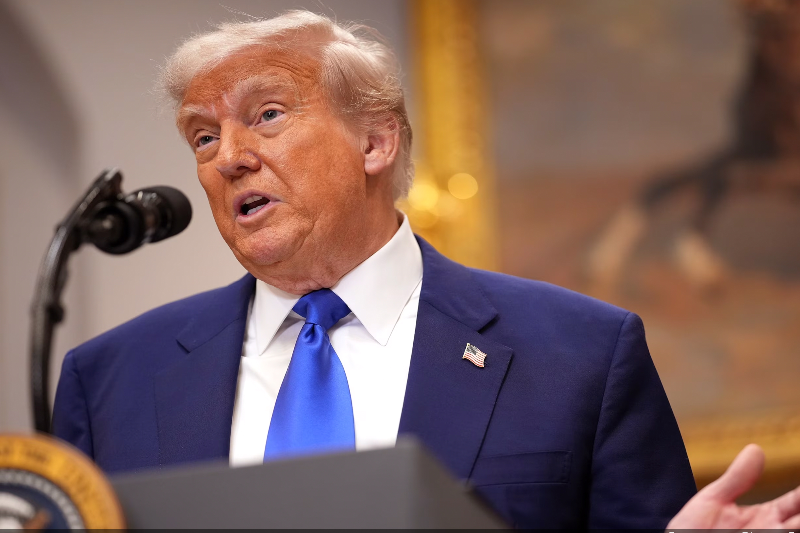
Trump’s Plan to Dismantle the Education Department Halted by Federal Judge: What This Means for U.S. Public Education
In a landmark decision with far-reaching implications for American public education, U.S. District Judge Myong Joun has blocked the Trump administration’s controversial move to dismantle the U.S. Department of Education. The preliminary injunction not only halts the plan to phase out the department but also orders the reinstatement of employees who were abruptly laid off earlier this year.
This ruling comes as a significant victory for educators, school districts, and unions who have been sounding the alarm over what they described as an unprecedented executive overreach. The lawsuit was filed by the Somerville and Easthampton school districts in Massachusetts, the American Federation of Teachers (AFT), and other advocacy groups who argued that President Trump’s plan amounted to an unconstitutional attempt to dismantle a vital federal agency — all without Congressional approval.
“Irreparable Harm” to Education
In a strongly worded opinion, Judge Joun sided with the plaintiffs, emphasizing the potential long-term damage the administration’s actions could inflict. “The plaintiffs paint a stark picture of the irreparable harm that will result from financial uncertainty and delay, impeded access to vital knowledge on which students and educators rely, and loss of essential services for America’s most vulnerable student populations,” he wrote.
The judge noted that the mass layoffs, executed on March 11, “will likely cripple the Department,” leaving crucial programs — such as special education support, federal student aid distribution, and civil rights enforcement — in disarray.
The plaintiffs highlighted how the sudden reduction in staffing brought several key federal education programs to a standstill. School districts across the nation were left without federal guidance at a time when clarity and support were most needed, especially as schools continue to navigate post-pandemic recovery efforts and address longstanding inequities in education.
Restructuring or Shutdown?
The Trump administration has defended its actions as part of a broader effort to streamline government operations and reduce bureaucracy. Officials claimed that the downsizing was part of a restructuring initiative aimed at improving efficiency. However, the lack of Congressional authorization and the dramatic scale of the layoffs led the court to view the move not as a reform, but as a de facto attempt to shut down the department.
Critics of the administration’s plan argue that while calls for efficiency in governance are valid, they should not come at the cost of dismantling institutions that provide critical support to students, educators, and schools.
A Political Lightning Rod
Trump’s stance on the Department of Education has long been polarizing. During both his previous presidency and current campaign, he has repeatedly promised to abolish the department, framing it as an example of federal overreach into local education. For his supporters, the move is seen as a step toward returning control to states and local communities. But for education professionals and public school advocates, it represents a grave threat to the nation’s education system, particularly for underserved and marginalized populations.
Judge Joun’s ruling does not permanently block the administration’s goals but sets a strong legal precedent. The injunction is temporary, pending further judicial review, but it sends a clear signal: any attempt to dismantle a federal agency must go through the proper legislative channels.
Looking Ahead to 2026
With the 2026 presidential election on the horizon, education is once again becoming a central issue in national debates. The Trump administration has indicated that while the court ruling is a setback, it remains committed to its legislative goal of closing the Department of Education. A spokesperson from the administration stated that while “certain services may be impacted until the reorganization is complete,” they are “committed to fulfilling statutory requirements.”
However, this reassurance has done little to calm concerns among educators and school leaders. Legal analysts warn that even without formal legislative approval, the executive branch can still weaken federal agencies by draining them of resources and personnel, effectively rendering them non-functional.
A Department on Life Support — But Still Breathing
For now, the U.S. Department of Education has been granted a reprieve. Fired workers are being reinstated, and essential services are beginning to resume. But the fight is far from over.
This case underscores the fragile balance between executive power and legislative authority — and its real-world implications for public education. As the legal battle continues, so does the broader conversation about the role of federal oversight in ensuring equitable, quality education for all American students.
In a deeply divided political landscape, the soul of the U.S. education system may well be at stake. But for the moment, at least, its heartbeat continues.



